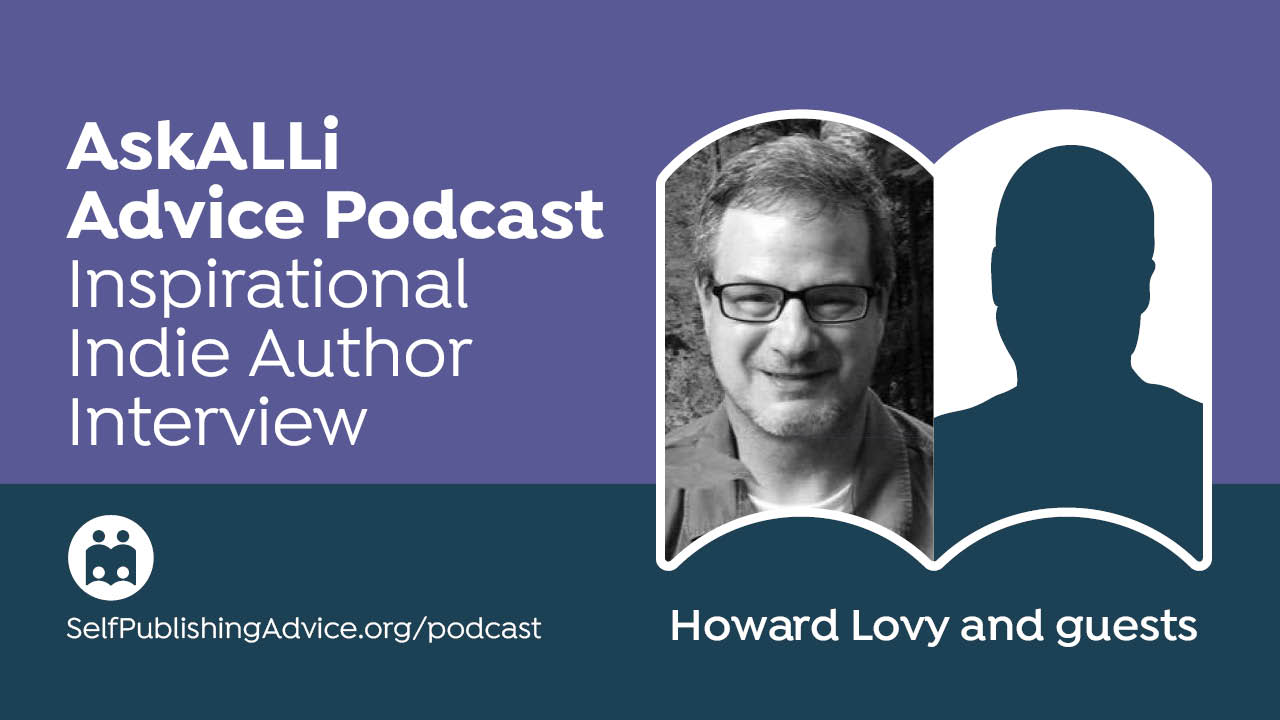My guest this week is Jude Lennon, an English children's author who does so much more than write. She is a traveling storyteller, going from school to school to instill in children a love for books, covering topics from pirates and astronauts to mindfulness and autism. She's the full package when it comes to indie publishing. She's not just selling books, but she's sharing her stories in unique ways. And, yes, Jude Lennon is related to that “other” Lennon from Liverpool.
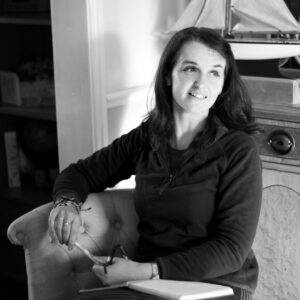
Jude Lennon
Every week I interview a member of ALLi to talk about their writing and what inspires them, and why they are inspiring to other authors.
A few highlights from our interview:
On the Link Between Oral and Written Storytelling
I think there's always going to be a link between oral storytelling and written storytelling. It's like breathing. You breathe in you breathe out, you read, you write. It’s all packed up in a package that all goes together, for me anyway. And so I think they're always going to be intrinsically linked.
On her Cousin, the ‘Other' Lennon
So, my dad's grandfather and John Lennon's grandfather are brothers. So, some kind of second cousin, I guess that makes us. So um, yeah, I'm not expecting an invite to any family gatherings anytime soon.
Listen to my Interview with Jude Lennon
Subscribe to our Ask ALLi podcast on iTunes, Stitcher, Player.FM, Overcast, Pocket Casts, or Spotify.
Interview with Jude Lennon, a Traveling Children's Storyteller: Inspirational Indie Authors Podcast Share on XFind more author advice, tips and tools at our Self-publishing Author Advice Center: https://selfpublishingadvice.org, with a huge archive of nearly 2,000 blog posts, and a handy search box to find key info on the topic you need.
And, if you haven’t already, we invite you to join our organization and become a self-publishing ally. You can do that at http://allianceindependentauthors.org.
About the Host
Howard Lovy has been a journalist for more than 30 years, and has spent the last six years amplifying the voices of independent publishers and authors. He works with authors as a book editor to prepare their work to be published. Howard is also a freelance writer specializing in Jewish issues whose work appears regularly in Publishers Weekly, the Jewish Daily Forward, and Longreads. Find Howard at howardlovy.com, LinkedIn and Twitter.
Read the Transcript
Howard Lovy: I'm Howard Lovy, and you're listening to Inspirational Indie Authors. Every week I feature a member of the Alliance of Independent Authors to find out what inspires them and how they are an inspiration to other authors. My guest this week is Jude Lennon, an English children's author, who does so much more than write books. She's a traveling storyteller going from school to school to instill in children of love for books covering topics from pirates and astronauts to mindfulness and autism. She's a full package when it comes to indie publishing. She's not just selling books, but she's sharing her stories in unique ways.
Jude Lennon: Well, I'm Jude Lennon. I am a professional storyteller and until recently a children's author. I've now branched out into writing for adults as well. And a bookworm, absolutely loves books. I've always loved books since a very early age. I'm an ex-teacher. I taught for 18 years. So, in the UK it’s Early Years. For you, I think it's Kindy, over on your side of the pond. And so, did that for 18 years. So obviously, encouraging children to find a love for words and books and stories and writing as well was very key to me. And so yes, so that that's me, really. So, I've set up my storytelling business six years ago. So, I provide interactive storytelling, and of all kinds of things, fairy tales, traditional tales, folklore, stories from around the world, all kinds of things, really. And oral storytelling. So, everyone expects when you're a storyteller to sit down and get a book out, and that's part of storytelling, but this is orally, so I orally tell the stories from my memory, have a few props to help me. And it's just it's a really, really, lovely way. It's the oldest form of entertainment. I grew up in Liverpool in Southport, sorry, which is about 30 miles up the coast from Liverpool, but my dad grew up here. And I'm now living here. So I grew up in Southport, and then I lived in London for 11 years. And then I relocated back up here. I missed the sea when I lived in London. So, I needed to get back up north. And, and look, I've made Liverpool my home about nine years ago, and I love it. Absolutely love it.
Howard Lovy: First, let's take care of this. Yes, her name is Jude Lennon. And she's from Liverpool, England. And yes, that is absolutely fab.
Jude Lennon: Yes, we found out quite recently, really only three years ago, my dad’s sisters, both married Welshman, and were living in South Wales. And we're in a rambling group and one of the guys I saw was a historian, as you get chatting as you do, “oh, you know, you're from Liverpool, your maiden name was Lennon. Are you related?” And I said, “Well, we think we are. There’s family legend, but we don't really know.” And this guy said, “Well, I'll do some research.” And he did and yes It came back. So, my dad's grandfather and John Lennon's grandfather are brothers. So, some kind of second cousin, I guess that makes us. So um, yeah, I'm not expecting an invite to any family gatherings anytime soon.
Howard Lovy: But hey, her name is Jude. Was she named for the famous song?
Jude Lennon: No not at all although my first name is actually Judith, but I will, I will grow into that when I'm older.
Howard Lovy: Maybe when she's 64? Now Jude is a storyteller. She's always been, and she used her original stories as a teaching tool for her students. Then one day, somebody heard one of her stories and suggested that maybe she should put them in a book.
Jude Lennon: Yeah, gosh, well, I'd always written I've always written you know, as long as I can remember, and hold a pen really. And obviously, being a teacher. I was always writing for the children in my classes as well. I'd write stories and poems and jingles. And I was always end up writing the Christmas play every year and activity and things like that. And it was just something I did. I just never really thought about going the next stage and getting that writing put into a book. And it was actually one the head teachers I worked with in London, the sort of suggested to me we were being filmed from training University, Roehampton University, which trains teachers and they came in told me that my class was the one that was going to be filmed.. So the people came in from the university and I used one of the stories I've written as a prompt for the class. And at the end, the chap came over from the university and said, “That's great. Have you ever thought about getting that published?” And I was like, “Oh, is that what you do then? Okay, thanks I’ll think about that.” And then the same week, the head teacher Jared, were in the staff room, and he said he's like the same thing. “So, have you ever thought of getting your work published? “And I was like, right, okay, that's two people in the same week and said, this maybe, this is something I need to start looking at doing. So that was really the start. And that was about 15 years ago probably now. And it took me another 10 years to get around to actually getting it done.
Howard Lovy: But Jude’s goal wasn't just to be a paperback writer. To her, stories were meant to be told out loud.
Jude Lennon: Yeah, well, obviously, I mean, writing is only the next stage on for Marvel storytelling, really, oral stories have existed, you know, since humans learned to communicate with words really. And it's only really once the human, you know, physiology developed that we were learning to write and record those things that they got sort of turned into written pieces that were then easier to pass on than word of mouth because it was something solid. So I think there's always going to be a link between oral storytelling and written storytelling. It's like breathing. You breathe in you breathe out, you read, you write. It’s all packed up in a package that all goes together, for me anyway. And so I think they're always going to be intrinsically linked.
Howard Lovy: Jude was feeling a little burned out as a teacher, but then something happened that made her take a sad song and make it better. That's something was Winnie the Pooh. Yes, Jude Lennon is the official Disney Winnie the Pooh laureate for the Northwest.
Jude Lennon: Well, the Disney Winnie the Pooh laureate, that was actually what prompted me to really get my books in print. I came out of teaching was very, very, very depressed and anxious. I was signed off work and decided not to go back into teaching as a result of.
And over here we have Strictly Come Dancing, I think is Dancing with the Stars over your side of the pond. And they have a program on during the week and Jamie Theakston, who's a very well-known name over here was on with cerebral the host desk who was also very well known. And he said, we're having this competition. We want people to write about Winnie the Pooh, visiting your local area. And there’s going to be five regions, and they'll be a Disney Winnie the Pooh laureate for each region. And I was shortlisted, had to read my story over the phone to a lady in America at Disney that was nerve racking, and shortlisted again that and eventually they told me I'd won the Northwest. And when I went along to the sort of celebration, the lady who judged at this end, Jane Costello, she's an author as well, and she said to me, “Please promise me you're going to try to keep getting your work published. You really have got to try and do it.” And that was really the turning point for me I thought, right. Okay, that's You know, this is a lady who's, you know, got a big catalog of books and readers and she's thinking the works good enough it kind of bashed down the imposter syndrome.
Howard Lovy: Jude no longer teaches permanently at a school, but she is what they call a patron of reading, traveling from school to school to encourage a love of books and reading.
As for Jude's books, they cover the usual things that children enjoy dragons, pirates, astronauts, but she also writes about mindfulness, which is not always something you identify with children.
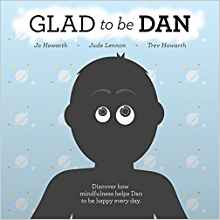 Jude Lennon: Well, yes, mindfulness is more about helping them cope, with giving them tools to be able to cope with anxiety or anger or worry or those kind of things. I collaborated with Jo Howarth from The Happiness Club who practices mindfulness and actually goes into schools and gives children and staff practical ways of, you know, being mindful and being more aware of their emotions. And we wrote the book together. So, the central character Dan is having a bit of a bad day and his mom gives him some techniques might involve breathing or focusing on other things or thinking about things to be glad for. The books called Glad to be Dan so that thinking about things you can be glad for in the day, even if you having a really bad day you can still be say, “Well, I'm glad because I, you know, I've got somebody who gave me hope this morning. I'm glad because I had nice warm cup of tea.” There's always something that you can find that a positive.
Jude Lennon: Well, yes, mindfulness is more about helping them cope, with giving them tools to be able to cope with anxiety or anger or worry or those kind of things. I collaborated with Jo Howarth from The Happiness Club who practices mindfulness and actually goes into schools and gives children and staff practical ways of, you know, being mindful and being more aware of their emotions. And we wrote the book together. So, the central character Dan is having a bit of a bad day and his mom gives him some techniques might involve breathing or focusing on other things or thinking about things to be glad for. The books called Glad to be Dan so that thinking about things you can be glad for in the day, even if you having a really bad day you can still be say, “Well, I'm glad because I, you know, I've got somebody who gave me hope this morning. I'm glad because I had nice warm cup of tea.” There's always something that you can find that a positive.
Howard Lovy: And as if she were waiting for someone to perform with, somebody else came into Jude's life an autistic boy and in him, she found a co author and illustrator.
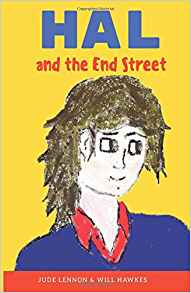 Jude Lennon: Yeah, I'm in a networking group called Biz Mums, which is for women and mums. I'm not I'm not a mom, but it's for women and moms in business, who, there's just it's a supportive community, and we will help each other, and I met a lady called Jane Hawks and her son is autistic. And she just approached me, she said, you know, I really feel that I'd like, you know, my son Will and you to maybe write a book to help children with autism. And I said, Yeah, absolutely, I'd love to. So, I met with Will and when I first met him, this is a real amazing, this one thing I'm most proud of really. And when I first met Will, he was nearly 16 and he didn't really want to make eye contact and really want to engage in any way was very, very painfully shy and articulated himself could articulate but was very, you know, very, very sparing of words and vocab that you wanted to use to express how he felt. And I sat with him in a cafe and I just said, Okay, let's talk about the story, and Jane was like thinking oh gosh, this is gonna be a waste of time. He's not gonna say anything. I think maybe the teacher in me I just question I just said, what and what would you like the characters to be? And what do you think they would do? Is there going to be a dog in the family and I just questioned him. And then by the end of the session, we had a plan for a story and Will provide the illustrations for the book and it's a chapter book sort of age eight upwards, and at the end of each chapter, we have a chart to show how the main character has a choice about whether he chooses to do A and he lets his anxiety and the autism overwhelm him, or B he uses the technique to kind of help him cope. A lot of autistic people use stimming they shake their hand repeatedly to help themselves calm down, or maybe drum their fingers on the table. So, we gave him some techniques at the end of each chapter to be able to deal with it. And they're all techniques that Will have used in his life, you know, and this helped him and then on the back of that we've done wrote a second book, and Will did the illustrations again for that. And now he's at college. He's studying art. He’s helping to make a comic for a local youth project. He's been commissioned to do illustrations for somebody else's book. It's just been a most amazing experience for Will, he's just absolutely blossomed. And now he looks at the camera, he smiles when he looks at the camera. You know, he has been interviewed on telly, you know, it's been absolutely the most amazing thing for him.
Jude Lennon: Yeah, I'm in a networking group called Biz Mums, which is for women and mums. I'm not I'm not a mom, but it's for women and moms in business, who, there's just it's a supportive community, and we will help each other, and I met a lady called Jane Hawks and her son is autistic. And she just approached me, she said, you know, I really feel that I'd like, you know, my son Will and you to maybe write a book to help children with autism. And I said, Yeah, absolutely, I'd love to. So, I met with Will and when I first met him, this is a real amazing, this one thing I'm most proud of really. And when I first met Will, he was nearly 16 and he didn't really want to make eye contact and really want to engage in any way was very, very painfully shy and articulated himself could articulate but was very, you know, very, very sparing of words and vocab that you wanted to use to express how he felt. And I sat with him in a cafe and I just said, Okay, let's talk about the story, and Jane was like thinking oh gosh, this is gonna be a waste of time. He's not gonna say anything. I think maybe the teacher in me I just question I just said, what and what would you like the characters to be? And what do you think they would do? Is there going to be a dog in the family and I just questioned him. And then by the end of the session, we had a plan for a story and Will provide the illustrations for the book and it's a chapter book sort of age eight upwards, and at the end of each chapter, we have a chart to show how the main character has a choice about whether he chooses to do A and he lets his anxiety and the autism overwhelm him, or B he uses the technique to kind of help him cope. A lot of autistic people use stimming they shake their hand repeatedly to help themselves calm down, or maybe drum their fingers on the table. So, we gave him some techniques at the end of each chapter to be able to deal with it. And they're all techniques that Will have used in his life, you know, and this helped him and then on the back of that we've done wrote a second book, and Will did the illustrations again for that. And now he's at college. He's studying art. He’s helping to make a comic for a local youth project. He's been commissioned to do illustrations for somebody else's book. It's just been a most amazing experience for Will, he's just absolutely blossomed. And now he looks at the camera, he smiles when he looks at the camera. You know, he has been interviewed on telly, you know, it's been absolutely the most amazing thing for him.
Howard Lovy: Jude’s latest challenge was to transition from children's to adult literature,
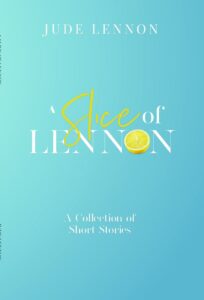 Jude Lennon: It was weird really; I didn't really think I'd ever do it. I thought it's going to be firmly writing, the children's camp forever more. But I'm in a writing group, we always write around a different theme. And one month, somebody said, I know let's give ourselves an extra challenge as well. So, my challenge was, I couldn't write something for children. So that was the start of it I though oh I quite like this. This is quite liberating. Oh, yeah, I think I'm going to do a bit more of this. So, I started to write the writing group only all the stories I wrote after that were for an adult audience, and I was like, oh, and then suddenly still, you know, maybe should put them in a collection. Okay, so I did put them in a collection. And it was it's been really well received, which is lovely. And I think people are quite shocked at how diverse the topics are. You know, it's not very, not all very same. It's called A Slice of Lennon. And it's Yeah, all the stories are very, very different. It covers everything from loss, to thrillers, to murder, to history, to a little bit of romance, you know, there's all, humor, there's all kinds in there. And on the back that I'm now working on a full length novel, which is a new expense again.
Jude Lennon: It was weird really; I didn't really think I'd ever do it. I thought it's going to be firmly writing, the children's camp forever more. But I'm in a writing group, we always write around a different theme. And one month, somebody said, I know let's give ourselves an extra challenge as well. So, my challenge was, I couldn't write something for children. So that was the start of it I though oh I quite like this. This is quite liberating. Oh, yeah, I think I'm going to do a bit more of this. So, I started to write the writing group only all the stories I wrote after that were for an adult audience, and I was like, oh, and then suddenly still, you know, maybe should put them in a collection. Okay, so I did put them in a collection. And it was it's been really well received, which is lovely. And I think people are quite shocked at how diverse the topics are. You know, it's not very, not all very same. It's called A Slice of Lennon. And it's Yeah, all the stories are very, very different. It covers everything from loss, to thrillers, to murder, to history, to a little bit of romance, you know, there's all, humor, there's all kinds in there. And on the back that I'm now working on a full length novel, which is a new expense again.
Howard Lovy: So, Jude Lennon is a model indie author. Like her famous distant cousin, she wasn't content just to do one thing. She's a children's author, short story writer, performer, teacher, and everything else she can come up with in the future. Being an indie author is not limiting. Jude shows that anything can be done. The movement you need is on your shoulder.
Jude Lennon: People always want to know is how can I sell more books you know and gosh if I had the magic recipe for that I'd be very rich indeed. But yeah when it comes to marketing go outside the box because I've got my books in places like the local pet shop below our house and they stock my books nothing to do you know the books are not about anything they sell, you know, there's dragon books in there and The Slice of Lennon books in there. But you know, people pop in with their animals. Oh, Oh, she lives upstairs oh does she Oh how exciting and they but it because it’s local. You know just say there's a shop across the road a couple of local shops with here to me that stock the books that were not you know, there's a beautician, there’s a Chandler's which like a haberdashery now, they're not nothing to do with my books, but they stock them because they're supporting local business. Also look at going to events, you know, and things like that, that aren't necessarily literary events, just other things that might feel and I definitely think working, going into schools and giving talks and events like that are definitely great ways to get in front of audiences that you wouldn’t normally get in front of. But in terms of advice, you know if anybody does have the advice about how to get more sales on Amazon, I will happily take on board as well.

